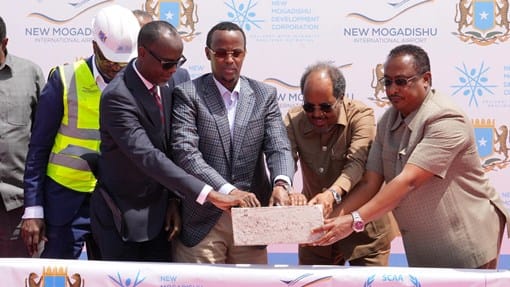President Hassan Sheikh Mohamud has officially laid the foundation stone for a new international airport near Mogadishu, marking a milestone in Somalia’s infrastructure and post-conflict recovery efforts.
The new airport will be located in the Warsheekh district of the Middle Shabelle region, approximately 70 kilometers north of the capital. At Sunday’s groundbreaking ceremony, President Mohamud hailed the project as a symbol of resilience and a key driver of economic growth and regional integration.
“This airport will serve as a gateway for both the Somali people and international travelers,” the president stated. “It stands as proof of our commitment to rebuild and reconnect areas once scarred by conflict and terrorism.”
The project is set to be implemented by a Somali-owned firm, underlining the growing capacity and contribution of local companies in Somalia’s reconstruction phase. Federal and regional officials, including Hirshabelle State President Ali Gudlawe Hussein, were in attendance at the ceremony.
Though detailed technical designs have not yet been made public, preliminary outlines suggest the airport will include at least two parallel runways—each around 4,000 meters in length—capable of handling wide-body aircraft. Facilities will reportedly feature distinct domestic and international terminals, modern cargo services, aircraft maintenance facilities, fuel storage systems, and a state-of-the-art air traffic control tower.
Aviation industry observers estimate the full cost of the project could surpass $1 billion, once all operational infrastructure and security measures are included.
The existing Aden Adde International Airport, situated in southern Mogadishu, currently manages most of the country’s civilian and military air traffic but is nearing full capacity. Its single runway, 3,150 meters long, is increasingly strained by growing demand for both commercial and humanitarian flights.
If completed as envisioned, the new airport in Warsheekh is expected to alleviate pressure on Aden Adde, open up central Somalia to more domestic and international routes, and further enhance the country’s economic prospects.



